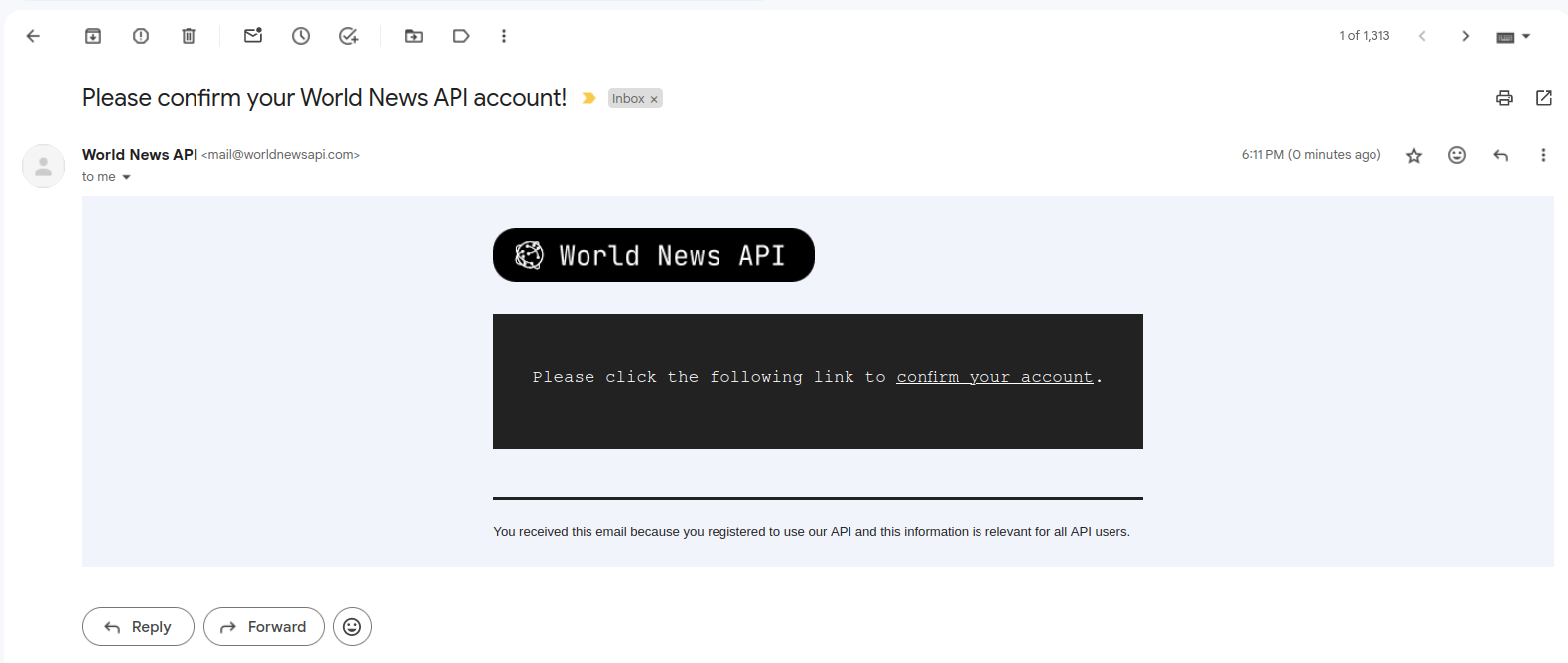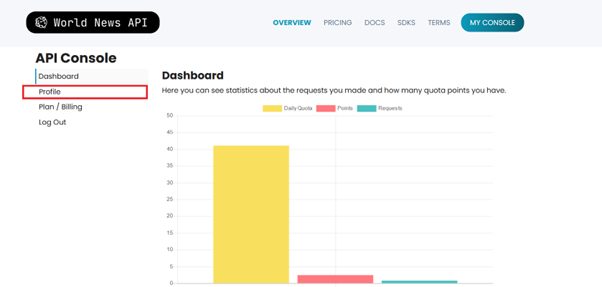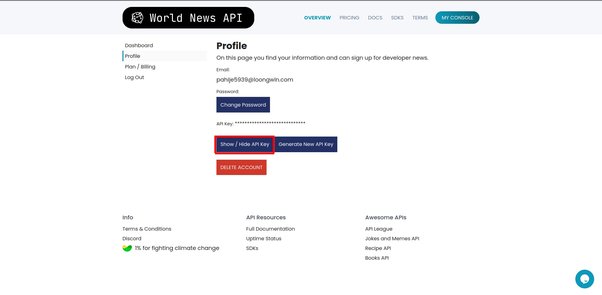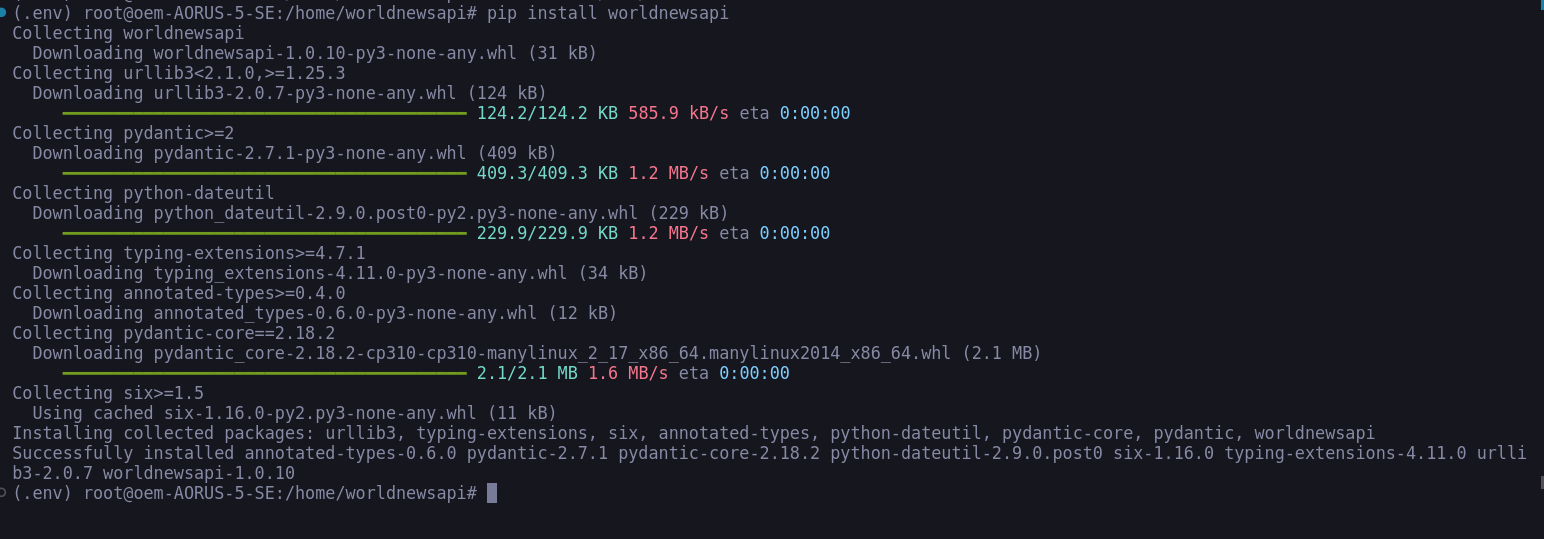Tutorial on how to get started with the News API
World News API is an API that gives you access to thousands of news sources in over 50 languages from over 150 countries. The News accessed through the API is semantically tagged, allowing for semantic news search by location, person or organisation. This article will look at how you can get the World News API up and running.
Create an Account
To start, visit the World News API website and create an account. Once an account is created, confirming the email address is the next step. This is an important step, as you won't be able to access the API until you've confirmed your email. You will receive an email on the email you registered with. It will look something like this:

Simply click on confirm your account. After which, your account will be verified.
Getting the API Key
Now that your email is verified. Log in to your World News API account and obtain your API key. API key is a unique identifier that allows you to access the API and request news articles.
After you have successfully logged in, perform the following steps to obtain your API key.
From your dashboard, click on "Profile".

In the "Profile" section, click on "Show/Hide API Key" to show your API key.

Copy the API Key and save it somewhere safer for easier access. Don’t share it with anyone else!
Using the API
For this tutorial, we will be using the worldnewsapi Python SDK. Refer to our SDK Page if you are interested to try the API in another language.
Installing the SDK
To install the SDK, execute the following commands:
pip install worldnewsapi
We have installed the worldnewsapi SDK for Python and required dependencies!
Making your First Request
Now that the SDK has been successfully installed, let’s test it out to see if we can successfully fetch some news.
Let's use the search_news function to search for news which contain the word "football" in the UK.
Step 1. Import the SDK
import worldnewsapi
from worldnewsapi.rest import ApiExceptionThe imports are as follows:
- worldnewsapi: The SDK itself
- worldnewsapi.rest.ApiException: API Exception Object for exception handling
Step 2. Initialize Configuration
Initialize the API configuration and set the API key with:
newsapi_configuration = worldnewsapi.Configuration(api_key={'apiKey': <YOUR_API_KEY>})Replace <YOUR_API_KEY> with the API key you obtained above.
Step 3. Instantiate an object of NewsAPI & start search
try:
newsapi_instance = worldnewsapi.NewsApi(worldnewsapi.ApiClient(newsapi_configuration))
response = newsapi_instance.search_news(
text='football',
source_countries='gb',
language='en',
earliest_publish_date='2024-07-01',
latest_publish_date='2024-07-17',
categories='sports',
sort="publish-time",
sort_direction="desc",
min_sentiment=-0.8,
max_sentiment=0.8,
offset=0,
number=10)
except ApiException as e:
print("Exception when calling NewsApi->search_news: %s\n" % e)Basically, we will be searching for news which contain the word football in the UK(source_countries:'gb') in English language. The news will have its sentiment between -0.8 and 0.8.
It
will be published between 2022-04-22 and 2024-05-05. There will be a total of
10 fetched such news articles.
You can set text to an empty string to limit the filtering to the other parameters.
Refer to the parameters of search_news for more details.
Step 4. Process response
Now we can process the response and output the retrieved data:
for article in all_results:
print("\nTitle: " + str(article.title))
print("Authors: " + str(article.authors))
print("URL: " + str(article.url))
print("Sentiment: " + str(article.sentiment))
print("Text: " + str(article.text[:80]) + "...") # print first 80 characters of the text
Step 5. Add paging (optional)
The API will respond with a maximum of 100 articles. If you want to retrieve more, you'll need to add paging to your query.
Your code could look like this:
max_results = 250 # replace with your maximum
offset = 0
all_results = []
while len(all_results) < max_results:
request_count = min(100, max_results - len(all_results)) # request 100 or the remaining number of articles
response = newsapi_instance.search_news(
text='football',
source_countries='gb',
language='en',
earliest_publish_date='2024-07-01',
latest_publish_date='2024-07-17',
categories='sports',
sort="publish-time",
sort_direction="desc",
min_sentiment=-0.8,
max_sentiment=0.8,
offset=offset,
number=request_count)
print("Retrieved " + str(len(response.news)) + " articles. Offset: " + str(offset) + "/" + str(max_results) +
". Total available: " + str(response.available) + ".")
if len(response.news) == 0:
break
all_results.extend(response.news)
offset += 100Full Code
The full code is as follows:
import worldnewsapi
# Initial SDK configuration
newsapi_configuration = worldnewsapi.Configuration(api_key={'apiKey': '<YOUR API KEY>'})
try:
newsapi_instance = worldnewsapi.NewsApi(worldnewsapi.ApiClient(newsapi_configuration))
max_results = 250 # replace with your maximum
offset = 0
all_results = []
while len(all_results) < max_results:
request_count = min(100, max_results - len(all_results)) # request 100 or the remaining number of articles
response = newsapi_instance.search_news(
text='football',
source_countries='gb',
language='en',
earliest_publish_date='2024-07-01',
latest_publish_date='2024-07-17',
categories='sports',
sort="publish-time",
sort_direction="desc",
min_sentiment=-0.8,
max_sentiment=0.8,
offset=offset,
number=request_count)
print("Retrieved " + str(len(response.news)) + " articles. Offset: " + str(offset) + "/" + str(max_results) +
". Total available: " + str(response.available) + ".")
if len(response.news) == 0:
break
all_results.extend(response.news)
offset += 100
except worldnewsapi.ApiException as e:
print("Exception when calling NewsApi->search_news: %s\n" % e)
for article in all_results:
print("\nTitle: " + str(article.title))
print("Author: " + str(article.author))
print("URL: " + str(article.url))
print("Sentiment: " + str(article.sentiment))
print("Text: " + str(article.text[:80]) + "...") # print first 80 characters of the textTo get the top news for a given day, country, and language, you can run this script
try:
response = newsapi_instance.top_news(
source_country='us',
language='en',
var_date='2024-06-01',
headlines_only=False)
except worldnewsapi.ApiException as e:
print("Exception when calling NewsApi->search_news: %s\n" % e)
for news in response.top_news:
print ("\n\nNext Cluster ##########################################\n")
for article in news.news:
print("Title: " + str(article.title))
print ("URL: " + str(article.url))
print("Text: " + str(article.text[:80]) + "...") # print first 80 characters of the text
And that's it! You can explore more functionalities such as extracting news links, extracting news from a page and others from Github.
Happy coding.
 1% for fighting climate change
1% for fighting climate change